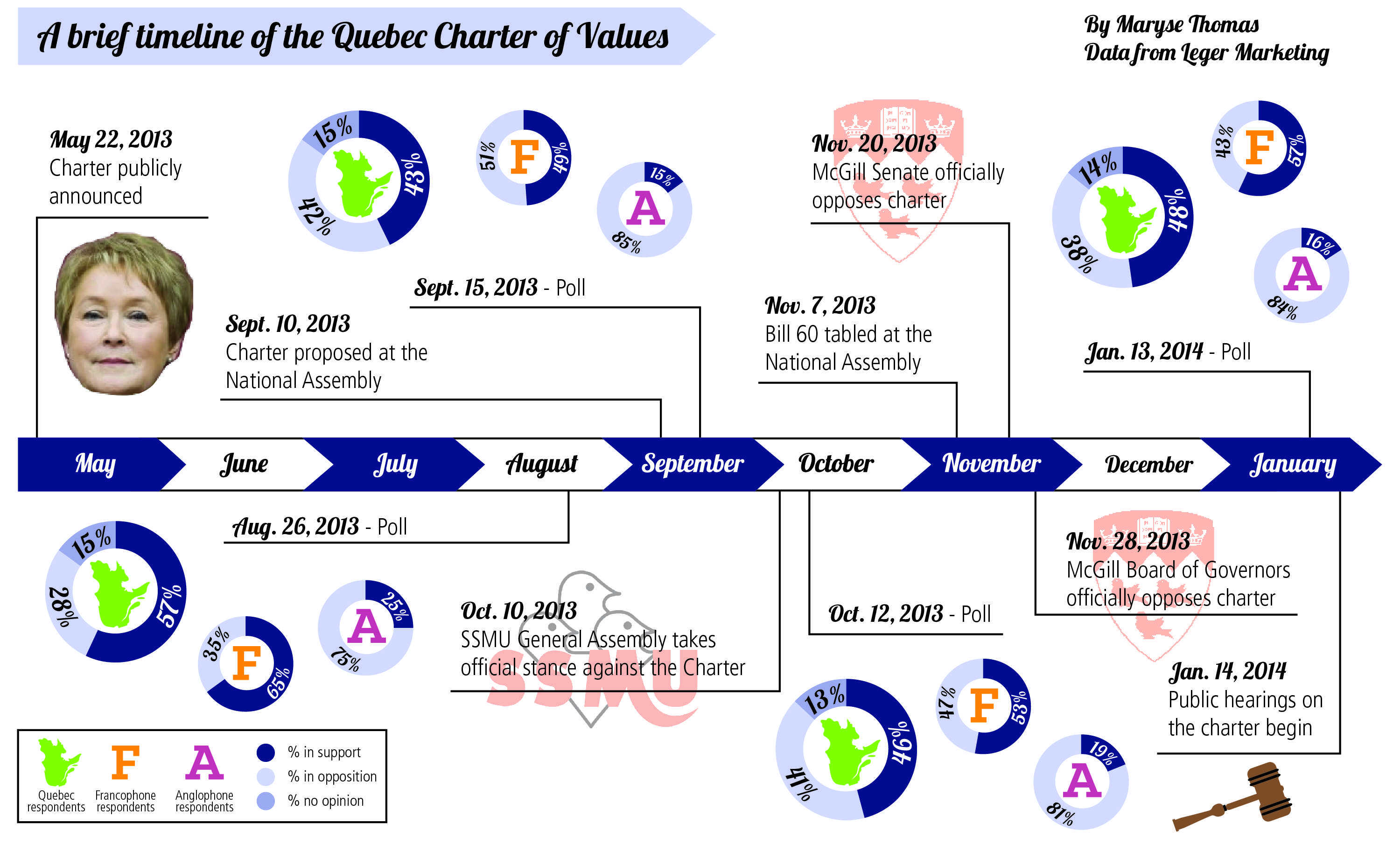On Jan. 14, public hearings on the controversial Bill 60 opened in Quebec City.
With 200 hours scheduled for presentations from approximately 250 organizations and individuals, the consultation process is one of the largest in recent years undertaken by a provincial government, and is expected to stretch into March. This week, the McGill Tribune looks into the specifics of the bill, its major points of contention, and reactions to it from both individuals and institutions.
More commonly known as the Charter of Values, Bill 60 was tabled by the Parti Québécois’ (PQ) government at the National Assembly on Nov. 7, 2013. The bill outlines measures that would restrict public employees from wearing visible religious symbols such as hijabs, kippas, and turbans in the workplace, and would affect institutions including hospitals and universities.
“If the state is neutral, those working for the state should be equally neutral in their image,” Bernard Drainville, the minister who introduced the bill in September, said in his speech to the National Assembly.
Bill 60 provides universities, hospitals, and municipalities a transition period of five years to implement its measures. A similar bill that only applied to civil servants had been tabled at the National Assembly in 2010, but ultimately failed to pass into law.
Measures similar to Bill 60 have been passed in France, Germany, and Belgium. In France, a 2004 law bans people from wearing conspicuous religious symbols in schools.
At McGill, various decision-making boards, including the Board of Governors, the Senate, the Students’ Society of McGill University (SSMU), and the Post-Graduates’ Student Society (PGSS) have expressed their opposition to the bill.
Individuals like political science professor Catherine Lu have also acted against the bill. Lu wore a hijab to her lectures for one week in September in protest against the bill.
“The main reason I will join this protest […] is to express my solidarity with vulnerable groups—mainly minority religions—and to convey my dissent against the restrictions in Bill 60 on individual freedom of expression and religion,” Lu said.
Lu explained that she intends to raise awareness of the charter and engage her students in the issue.
“The message needs to be clear,” Lu said. “The proposed Charter does not need to be amended; it needs to be rejected by the National Assembly.”
Other institutions and groups opposing the bill include Concordia University, the Jewish General Hospital, the Quebec Provincial Association of Teachers, and the English Montreal School Board.
However, the bill has also received widespread support across Quebec. A poll run by Canadian research firm Leger Marketing has shown that there is a consistent, near-equal split between Quebecers who support the charter and those who do not, and that the majority of francophones support the Charter.
According to the poll, 48 per cent of Quebecers say the charter is a good idea, versus 28 per cent who say it is not. 52 per cent of francophones support the bill, in comparison to only 13 per cent of Anglophones.
At McGill, professor Yvan Lamonde from the department of French language and literature is among the francophone population who support Bill 60. Lamonde sees the experience of Quebecers during the premiership of Maurice Duplessis as one of the reasons that many Francophones hold this view, when prior to the Quiet Revolution of the 1960s, the Catholic Church held political control over the province’s health care and education systems.
“[Quebecers] know by experience what it means to give such an importance to religious symbols in public life,” Lamonde said. “It took them decades and decades to get rid of that. They do not want such religious domination to happen again.”
Lamonde explained the charter as key to completing the secularization of the province to promote a form of unity among all Quebecers.
“The charter [will help] achieve the unfinished process of secularization of the province since the Quiet Revolution at the level of state, and not limited to education,” he said. “The charter will [also] help us to make sure that principles for living together would [be] clear to all Quebecers, including recent Quebecers.”
Francophone universities have not been as vocal as their anglophone peers in opposition to the bill. Among the 14 francophone universities in the province, only the Université de Montréal (UdeM), the Université de Sherbrooke, and the Université du Québec à Montréal have publicly addressed the Charter, while not explicitly opposing it.
“It doesn’t respond to our needs,” UdeM’s spokesman said last December, although the university did not take a stance against the bill.
Other groups who are supportive of Bill 60 include some of Quebec’s powerful labour unions; Mouvement laïque québécois, the province’s secularist movement; and the Janettes, a group of actresses and activists who believe that the charter would potentially increase gender equality.
As a minority government, the PQ requires the support of other parties to pass its bills. The opposition, however, has been highly critical of Bill 60.
The hearings take place as a method of public review on a bill, where members of the community can voice their opinions or concerns. While Members of the National Assembly (MNA) take public input into consideration, it does not necessarily have an impact on the final vote.
Furthermore, if passed into law, the bill could still be overturned by the Supreme Court of Canada.
“The prognosis is not good that [the charter] is going to pass, either because it would never come to the National Assembly or because it would be defeated,” professor Antonia Maioni from McGill’s department of political science said. “We will probably go into the next election with [the charter] as a live issue that hasn’t been resolved.”








